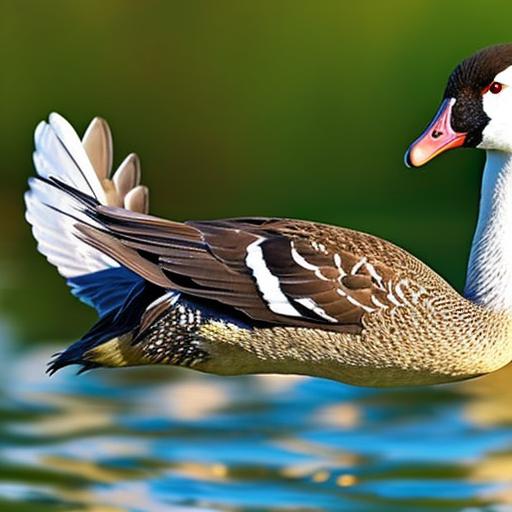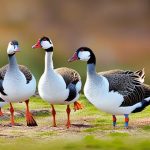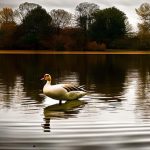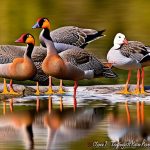Geese are fascinating and intelligent birds that can make wonderful pets. They are known for their loyalty, protective nature, and their ability to form strong bonds with their owners. Keeping geese in ponds can provide them with a natural and enriching environment, allowing them to exhibit their natural behaviors and thrive.
There are several benefits to keeping geese in ponds. Firstly, ponds provide geese with ample space to swim, which is essential for their physical and mental well-being. Swimming helps to keep their feathers clean and healthy, and it also provides them with exercise. Additionally, ponds offer geese a natural habitat where they can forage for food, socialize with other geese, and engage in natural behaviors such as nesting and breeding.
Key Takeaways
- Keeping geese in ponds can be a rewarding experience for both the geese and their owners.
- Choosing the right pond for your geese is important for their safety and well-being.
- Creating a safe and secure environment for your geese involves fencing, shelter, and predator control.
- Providing adequate food and water for your geese is essential for their health and happiness.
- Maintaining proper hygiene in your geese pond is crucial to prevent disease and keep the water clean.
Choosing the Right Pond for Your Geese
When choosing a pond for your geese, there are several factors to consider. Firstly, the size of the pond should be appropriate for the number of geese you plan to keep. Geese require a significant amount of space to swim and roam around, so the pond should be large enough to accommodate their needs.
In terms of depth, the pond should be at least 2-3 feet deep to allow the geese to fully submerge themselves while swimming. This depth also helps to prevent predators from easily accessing the geese in the water.
It is also important to consider the location of the pond. It should be situated in an area that is easily accessible for both you and your geese. Additionally, the pond should be located away from any potential hazards such as busy roads or toxic plants.
Creating a Safe and Secure Environment for Your Geese
To ensure the safety and security of your geese, it is important to implement appropriate fencing and netting options around the pond. This will help to prevent predators from accessing the geese while they are swimming or nesting.
The fencing should be tall enough to prevent predators from jumping over, and the mesh should be small enough to prevent predators from squeezing through. Additionally, it is important to regularly inspect the fencing for any signs of damage or wear and tear, and repair or replace it as necessary.
In addition to fencing, providing shelter and nesting areas for your geese is essential. Geese need a safe and comfortable place to rest and nest, especially during the breeding season. This can be in the form of a simple shelter or a dedicated nesting box. The shelter should be well-ventilated, dry, and protected from the elements.
Providing Adequate Food and Water for Your Geese
Geese have specific dietary requirements, and it is important to provide them with a balanced and nutritious diet. They are herbivores and primarily feed on grass, weeds, and other vegetation. However, they can also be supplemented with commercial waterfowl feed or a mix of grains.
It is important to ensure that the food provided is fresh and free from any contaminants. Additionally, geese require access to clean and fresh water at all times. This can be provided through a pond or by providing a separate water source such as a shallow pool or trough.
Water quality is also important for the health of your geese. The water should be clean and free from any pollutants or toxins. Regularly monitoring the water quality and cleaning the pond as necessary will help to maintain a healthy environment for your geese.
Maintaining Proper Hygiene in Your Geese Pond
To maintain a clean and healthy environment for your geese, it is important to regularly clean and disinfect the pond. This will help to prevent the buildup of bacteria, algae, and other pathogens that can be harmful to your geese.
Cleaning the pond involves removing any debris such as leaves or branches, as well as regularly skimming the surface of the water to remove any floating algae or other plants. Disinfecting the pond can be done using a non-toxic pond cleaner or by adding beneficial bacteria that help to break down organic matter.
Managing algae and other pond plants is also important for maintaining proper hygiene. Excessive algae growth can deplete oxygen levels in the water and create an unhealthy environment for your geese. Regularly monitoring and managing algae growth through methods such as manual removal or the use of natural algaecides will help to keep the pond clean and healthy.
Understanding the Behavior of Geese in Ponds
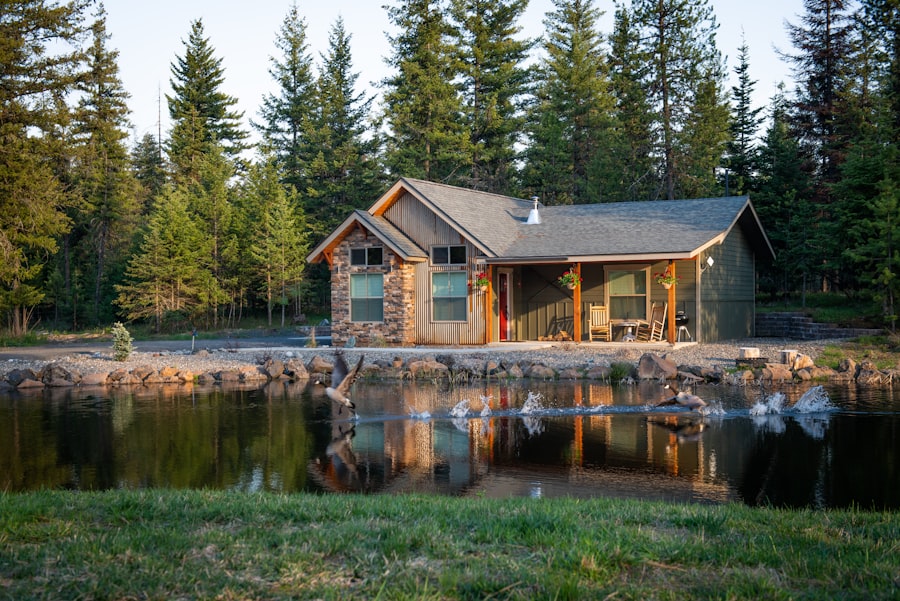
Geese are social animals that thrive in the company of other geese. They form strong bonds with their flock members and rely on each other for protection and companionship. Understanding their social behavior is important for providing them with a suitable environment.
Geese also have specific nesting and breeding habits. During the breeding season, female geese will build nests and lay eggs. It is important to provide them with a safe and secluded area where they can nest and incubate their eggs. This can be in the form of a dedicated nesting box or a secluded area within the pond.
Training Your Geese to Stay in the Pond
Training your geese to stay in the pond can be achieved through positive reinforcement and consistent training. Start by gradually introducing them to the pond and rewarding them with treats or praise when they stay in the water.
It is important to be patient and consistent with your training efforts. Repeat the training sessions regularly and gradually increase the duration of time they spend in the pond. Eventually, they will learn that the pond is their designated area and will be more likely to stay there.
Encouraging geese to return to the pond can be done by providing them with food or treats near the water’s edge. This will help to associate the pond with positive experiences and encourage them to spend more time there.
Dealing with Predators and Other Threats to Your Geese
Geese can be vulnerable to predators such as foxes, raccoons, and birds of prey. It is important to implement strategies to protect your geese from these threats.
One effective method is to install motion-activated lights or sound devices around the pond. These can help to deter predators by creating a sense of danger or alertness.
Additionally, providing hiding spots or shelters for your geese can help to protect them from predators. This can be in the form of dense vegetation or artificial structures such as nesting boxes or shelters.
Monitoring the Health and Well-being of Your Geese
Regularly monitoring the health and well-being of your geese is essential for their overall welfare. Signs of illness or injury in geese can include lethargy, loss of appetite, abnormal droppings, or changes in behavior.
It is important to conduct regular health checks and observe your geese for any signs of distress or discomfort. If you notice any concerning symptoms, it is advisable to consult a veterinarian who specializes in avian medicine.
Tips for Successful Geese Pond Management
Successful geese pond management involves regular maintenance and upkeep of the pond. This includes cleaning and disinfecting the pond, managing algae growth, and regularly inspecting and repairing fencing or netting.
Building a strong relationship with your geese is also important for their well-being. Spend time with them, provide them with enrichment activities, and establish a routine that they can rely on.
Lastly, enjoy the benefits of keeping geese in ponds. Watching them swim and interact with each other in their natural environment can be a rewarding and fulfilling experience.
If you’re looking for the best way to keep geese in a pond, you may also be interested in an article on Poultry Wizard about the importance of having a heater for a chicken coop. This article discusses how a heater can help maintain a comfortable temperature for your chickens, ensuring their well-being during colder months. To learn more about this topic, check out the article here.
FAQs
What is the best way to keep geese in a pond?
The best way to keep geese in a pond is to provide them with a safe and secure environment that meets their basic needs.
What are the basic needs of geese?
The basic needs of geese include access to clean water, food, shelter, and protection from predators.
How can I provide clean water for geese in a pond?
You can provide clean water for geese in a pond by regularly cleaning the pond and ensuring that it is free from debris and pollutants.
What kind of food do geese eat?
Geese eat a variety of foods, including grasses, grains, and aquatic plants. They also enjoy fruits and vegetables.
How can I protect geese from predators?
You can protect geese from predators by providing them with a secure enclosure or shelter, such as a fenced-in area or a predator-proof coop.
What are some common predators of geese?
Common predators of geese include foxes, raccoons, coyotes, and birds of prey such as hawks and eagles.
Can geese live in a pond year-round?
Geese can live in a pond year-round as long as the pond is deep enough to prevent it from freezing over completely during the winter months. They also require access to food and shelter during the colder months.
Meet Walter, the feathered-friend fanatic of Florida! Nestled in the sunshine state, Walter struts through life with his feathered companions, clucking his way to happiness. With a coop that’s fancier than a five-star hotel, he’s the Don Juan of the chicken world. When he’s not teaching his hens to do the cha-cha, you’ll find him in a heated debate with his prized rooster, Sir Clucks-a-Lot. Walter’s poultry passion is no yolk; he’s the sunny-side-up guy you never knew you needed in your flock of friends!

